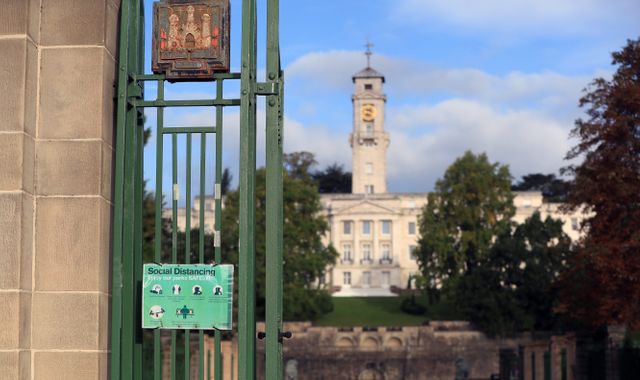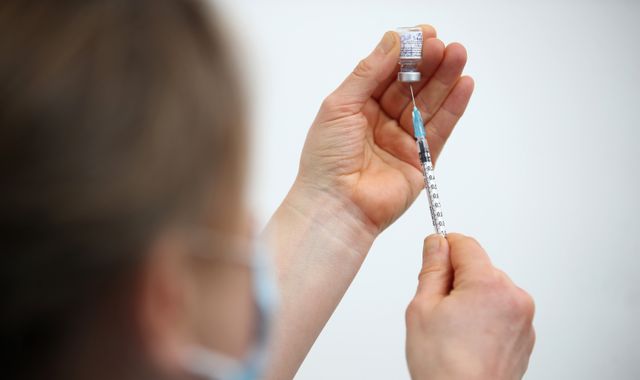COVID-19: First dose of vaccine reduces transmission by ‘about two-thirds’, says Matt Hancock
Written by News on 21/02/2021
The first dose of a COVID vaccine appears to reduce your chances of transmitting the disease by “about two-thirds”, the health secretary has told Sky News.

With one in three adults in the UK now having received a COVID jab, Matt Hancock confirmed the government’s new target of offering a vaccine to all adults in the UK by the end of July.
And he revealed Prime Minister Boris Johnson would offer a “cautious” roadmap for lifting England’s current lockdown restrictions on Monday, with people given an “indicative sense” of how measures might be eased.
Latest coronavirus updates from the UK and around the world
Once the first nine priority groups – including all over-50s – are offered a COVID jab by 15 April, the rest of the UK’s adult population will be in line for vaccines.
Mr Hancock told the Sophy Ridge On Sunday show that the Joint Committee on Vaccination and Immunisation has been asked to recommend which groups, beyond those first nine, should then be prioritised “in order to reduce the number of deaths as fast as possible”.
Asked whether children should also be vaccinated, the health secretary said that trials were underway to assess the safety and effectiveness of giving COVID vaccines to younger age groups.
“The importance of vaccinating children is to try to stop the spread of the disease and obviously that’s something, the impact of the vaccine on stopping transmission, is something that we have early evidence of,” he added.
“It looks like the first jab reduces your impact of transmitting the disease by about two-thirds but we need more evidence on that as well.”
On Monday afternoon, the prime minister will set out his roadmap for lifting lockdown restrictions, including the reopening of schools for all pupils.
Mr Hancock said the government would take a “cautious but irreversible approach” to easing COVID measures.
He added that ministers also wanted “to give that indicative sense and a direction so that people can start to begin to plan their lives in a way that they have all put on hold for, well, for the last year and certainly the last month or so when we have been in this second national lockdown”.
But the health secretary said the UK needed to remain “vigilant” against the spread of new COVID variants.
“We’ve now got a much stronger vigilance in place, because everybody coming into the country has to be tested and we sequence the results of those tests,” he said.
“And we’ve also got a very strong set of actions working with the local authorities very specifically in the areas where a new variant is found.
“We hit it hard and send in enhanced contact-tracing and go door-to-door. We’ve now got this programme in place to be able to really, really try to stamp out a new variant where we see it.
“There is evidence that is working.”
Subscribe to Sophy Ridge on Sunday on Apple Podcasts, Google Podcasts, Spotify, Spreaker
Asked if he meant the number of cases of the South African and Brazilian variants in the UK was falling, Mr Hancock replied: “Yes, I do and we’ve published the data on this so everybody will be able to see that.
“So there is evidence of that, but I want to be cautious here because we’ve got to be vigilant.
“If one of these new variants doesn’t respond to the vaccine as well as the others – as well as the standard variant in the UK, which is the Kent variant – then, if that’s the case, then that’s obviously a very serious risk for the vaccination programme,” he said.
“We’re doing a lot of work to find out the impact of the vaccine on these new variants – especially the ones discovered in Brazil and South Africa – because, clearly, the answer to that question is critical to understanding how much of a risk the new variants pose.
“But the good news is the actions we’re taking right now do appear to be working.”
The health secretary later revealed the government was “not yet” confident that the COVID vaccines currently in use in the UK were effective against all variants.
“We are confident the vaccine works effectively against both the old strain that’s been here for some time and the so-called Kent variant, which is now the main source of infection in this country,” he told the BBC’s Andrew Marr Show.
“We do not yet have the confidence the vaccine is as effective against the South Africa variant and the variant first seen in Brazil.”
Subscribe to the Daily podcast on Apple Podcasts, Google Podcasts, Spotify, Spreaker
The health secretary said there had been a total of 300 cases of the South Africa variant in the UK, but that most of these were “historic cases from over a month ago”.
“The latest data shows that there is around a dozen new ones – so a much, much smaller number,” he added.
“And each time we found a new one, we absolutely clamp down on it.”
Mr Hancock said, as the vaccine rollout continues across the UK, there are signs the number of people in hospital with COVID is “falling much more sharply” than it did during the first wave of infections last year.
One in three of all adults in the UK had now received a COVID vaccine, the health secretary added.
(c) Sky News 2021: COVID-19: First dose of vaccine reduces transmission by ‘about two-thirds’, says Matt Hancock







